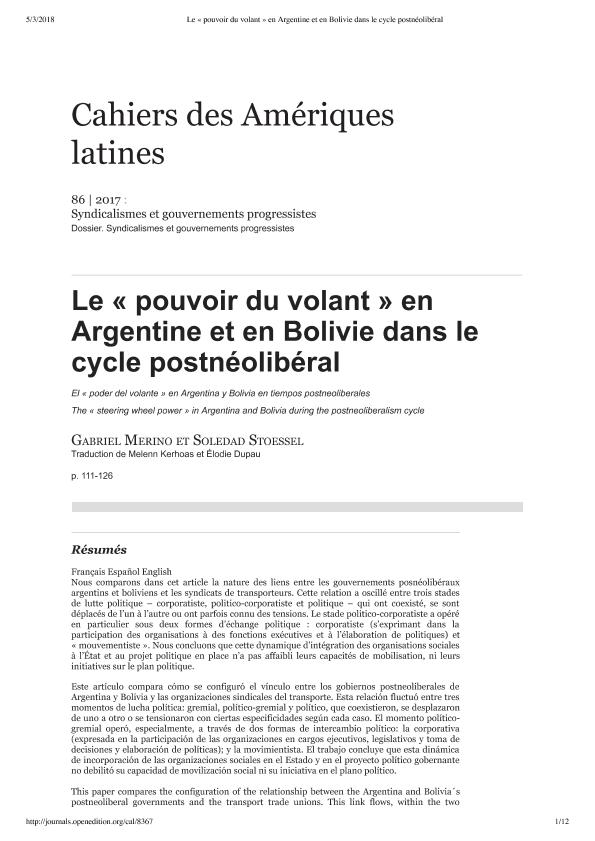Mostrar el registro sencillo del ítem
dc.contributor.author
Merino, Gabriel Esteban

dc.contributor.author
Stoessel, Soledad

dc.date.available
2018-07-16T16:55:46Z
dc.date.issued
2017-12
dc.identifier.citation
Merino, Gabriel Esteban; Stoessel, Soledad; Le "pouvoir du volant" en Argentine et en Bolivie dans lecycle postnéolibéral; Institut des Hautes Etudes de l'Amerique Latine; Cahiers des Amériques Latines; 86; 12-2017; 111-122
dc.identifier.issn
1141-7161
dc.identifier.uri
http://hdl.handle.net/11336/52189
dc.description.abstract
Este artículo compara cómo se configuró el vínculo entre los gobiernos postneoliberales de Argentina y Bolivia y las organizaciones sindicales del transporte. Esta relación fluctuó entre tres momentos de lucha política: gremial, político-gremial y político, que coexistieron, se desplazaron de uno a otro o se tensionaron con ciertas especificidades según cada caso. El momento político-gremial operó, especialmente, a través de dos formas de intercambio político: la corporativa (expresada en la participación de las organizaciones en cargos ejecutivos, legislativos y toma de decisiones y elaboración de políticas); y la movimientista. El trabajo concluye que esta dinámica de incorporación de las organizaciones sociales en el Estado y en el proyecto político gobernante no debilitó su capacidad de movilización social ni su iniciativa en el plano político.
dc.description.abstract
Nous comparons dans cet article la nature des liens entre les gouvernements posnéolibéraux argentins et boliviens et les syndicats de transporteurs. Cette relation a oscillé entre trois stades de lutte politique – corporatiste, politico-corporatiste et politique – qui ont coexisté, se sont déplacés de l’un à l’autre ou ont parfois connu des tensions. Le stade politico-corporatiste a opéré en particulier sous deux formes d’échange politique : corporatiste (s’exprimant dans la participation des organisations à des fonctions exécutives et à l’élaboration de politiques) et « mouvementiste ». Nous concluons que cette dynamique d’intégration des organisations sociales à l’État et au projet politique en place n’a pas affaibli leurs capacités de mobilisation, ni leurs initiatives sur le plan politique.
dc.description.abstract
This paper compares the configuration of the relationship between the Argentina and Bolivia´s postneoliberal governments and the transport trade unions. This link flows, within the two countries, through three moments of political struggle: the sectorial, the political-sectorial and the political one which co-existed, moved from one to another or were in constant tension with some specificities according to each country. The political-sectorial moments proceed, specially, through two ways of political interchange: the corporatist (expressed by the participation of labour organizations in executive and parliamentray positions and in the making of policies) and the “movement logic”. The article concludes that this way through which these social organizations were incorporated into the State and in the governmental political project did undermine neither their capacity of social mobilization nor their political initiative.
dc.format
application/pdf
dc.language.iso
fra
dc.publisher
Institut des Hautes Etudes de l'Amerique Latine
dc.rights
info:eu-repo/semantics/openAccess
dc.rights.uri
https://creativecommons.org/licenses/by-nc-nd/2.5/ar/
dc.subject
NEGOTIATION
dc.subject
POLITICS
dc.subject
POSTNEOLIBERALISM
dc.subject
TRANSPORT LABOUR ORGANIZATIONS
dc.subject.classification
Otras Sociología

dc.subject.classification
Sociología

dc.subject.classification
CIENCIAS SOCIALES

dc.title
Le "pouvoir du volant" en Argentine et en Bolivie dans lecycle postnéolibéral
dc.title
El "poder del volante" en Argentina y Bolivia en tiempos postneoliberales
dc.title
The "steering wheel power" in Argentina and Bolivia during the postneoliberalism cycle
dc.type
info:eu-repo/semantics/article
dc.type
info:ar-repo/semantics/artículo
dc.type
info:eu-repo/semantics/publishedVersion
dc.date.updated
2018-07-11T20:20:31Z
dc.journal.volume
86
dc.journal.pagination
111-122
dc.journal.pais
Francia

dc.journal.ciudad
París
dc.description.fil
Fil: Merino, Gabriel Esteban. Consejo Nacional de Investigaciones Científicas y Técnicas. Centro Científico Tecnológico Conicet - La Plata. Instituto de Investigaciones en Humanidades y Ciencias Sociales. Universidad Nacional de La Plata. Facultad de Humanidades y Ciencias de la Educación. Instituto de Investigaciones en Humanidades y Ciencias Sociales; Argentina. Universidad Nacional de Misiones; Argentina
dc.description.fil
Fil: Stoessel, Soledad. Consejo Nacional de Investigaciones Científicas y Técnicas. Centro Científico Tecnológico Conicet - La Plata. Instituto de Investigaciones en Humanidades y Ciencias Sociales. Universidad Nacional de La Plata. Facultad de Humanidades y Ciencias de la Educación. Instituto de Investigaciones en Humanidades y Ciencias Sociales; Argentina
dc.journal.title
Cahiers des Amériques Latines
dc.relation.alternativeid
info:eu-repo/semantics/altIdentifier/url/http://journals.openedition.org/cal/8367
dc.relation.alternativeid
info:eu-repo/semantics/altIdentifier/doi/http://dx.doi.org/10.4000/cal.8367
Archivos asociados
